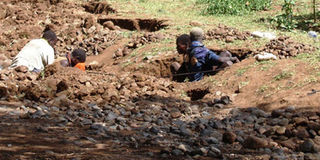Artisanal miners in Karamoja decry poor working conditions

Miners carry out small scale gold mining in Karamoja. FILE PHOTO
In a remote village of Nakabaat in Rupa Sub-county, Moroto District, lives about 1,500 households who eke a living from gold mining.
The miners here risk their lives to dig ore out of the earth, from which they extract gold.
At Nakabaat mines, about 300kgs of ore must be excavated to extract one gram of gold. Traders buy a gram between Shs110,000 and Shs210,000.
This is done under hazardous conditions worsened by lack of access to clean water, a health centre, a school and other basic necessities.
River Nakabaat is the only source of water for bathing and drinking in the community. The same river is used by the animals.
The river is now more contagious as some miners use mercury, a deadly chemical, to extract gold.
Ms Mary Napeyok, a miner at the site, says they are developing strange skin diseases due to drinking and bathing contaminated water.
“We have no option but to drink it. We also use it for cooking and bathing. Many of us have wounds but they heal by themselves,” Ms Napeyok says.
In 2018, the National Association of Professional Environmentalists in conjunction with Uganda National Association of Community and Occupational Health (NACOH) carried out the survey in gold mining areas, including Karamoja, and established that mines use mercury, a neurological toxicant, which affects the nervous systems of the people who get exposed to it.
Ms Napeyok says they have tasked leaders to drill for them a borehole so they can stop drinking contaminated water but they have never received any positive response.
“Even when we fall sick, we use herbs because walking to the healthy centre in Moroto Town takes us about eight hours and yet the roads are also in poor state,” she says.
Ms Sandra Aleper, another miner, says they are mistreated by men when they get money from selling gold, which they toil for hours to get.
“Whenever we get our gold and sell it, they take the money from us and they use it to buy alcohol,” a mother of one, says.
Findings from Ecological Christian Organisation (ECO), a non-government organisation, which is implementing the Karamoja Mining Governance project funded by Democratic Governance Facility (DGF) show that children and women, working in the mining and quarrying centres are also exploited and the girls are sexually abused.
Ms Prisca Ilukol, a project officer working with ECO, says children, who are employed in washing gold, excavating sand and grinding stones, suffer cough, chest pain and other waterborne diseases such as typhoid, diarrhoea, among others.
She said there is a need for legal and policy frameworks to effectively support sustainable management of the mining sector and safeguard interests of local communities.
The Moroto deputy chief administrative officer (CAO), Mr Edward Eko, says as a district, they are working to ensure that artisanal miners are organised so that they can obtain licences to operate legally.




